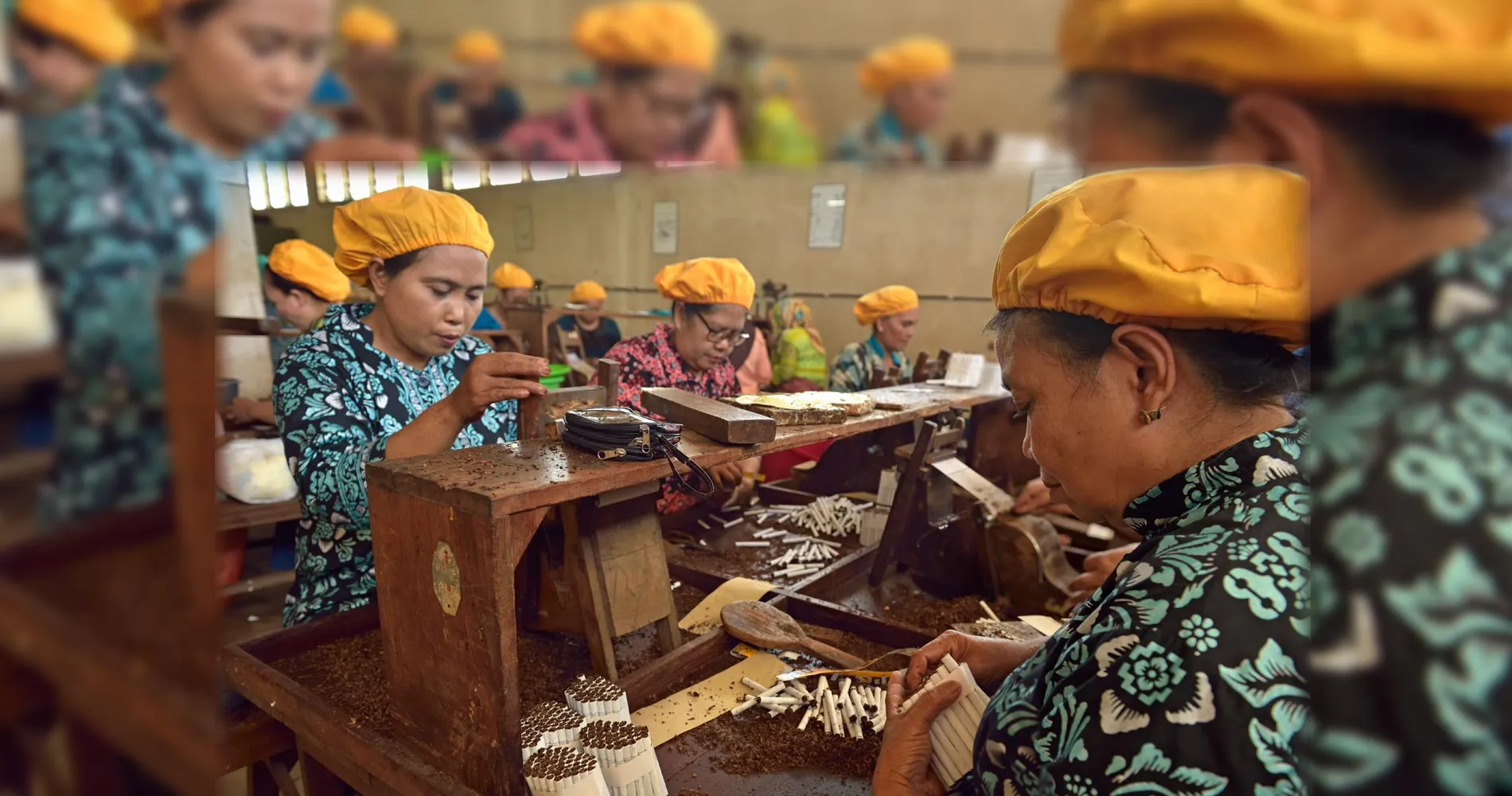The new Netflix series “Gladis Kretek” introduces a western audience to Indonesia’s kretek industry. Clove cigarettes are part of Indonesian culture and despite the considerable health risks associated with smoking kretek, Indonesians are in no hurry to curb their smoking habits. The secret ingredient in kretek is the clove, a spice which fueled western colonization and trade wars. Today transnational tobacco companies like Philip Morris and Japan Tobacco compete with Indonesia’s cottage industry of local small-scale manufacturers. The powerful kretek lobby has successfully blocked Indonesia from joining the WHO Framework Convention on Tobacco Control (FCTC).
Diana Mautner Markhof, 20 February 2024
Embedded in a bittersweet love story and set in the politically dangerous mid-1960s and the early 2000s, the newly released Netflix series Gladis Kretek (Cigarette Girl) highlights the central importance of kretek cigarettes for Indonesia/Java. The Netflix series deals with the role of women in Java society, social classes, the relationship of Indonesians to their Dutch overlords and the political prosecution and repression in the early days of the Suharto regime. For the western audience, Gladis Kretek will likely be the first time they hear about the Indonesian clove cigarette – kretek.
Indonesia is on track to becoming the country with the highest percentage of smokers by 2027. And what Indonesians smoke is kretek – flavored cigarettes made of tobacco, clove and a special sauce which is made from various herbs, spices and fruit extracts. This sauce gives kretek its special aroma. Gladis Kretek revealed that women were historically not allowed to mix the sauce, as this would contaminate the kretek with the “smell of woman”.
For Indonesians, kretek cigarettes remain an integral part of their cultural identity and heritage – and kretek sells. With practically no tobacco regulation and no limits to ads promoting smoking, the wealth which can be accumulated is staggering. The two richest men in Indonesia, the Hartono brothers, owners of Djarum kretek, have a net worth of USD 52 billion. Other kretek billionaires include Susilo Wonowidjojo (USD 7 billion) and Putera Sampoerna (USD 2.4 billion).
Clove Trade Wars
Clove is the special ingredient in kretek. Looking into the historical extremely lucrative clove trade, one is surprised to discover how this spice drove colonialization, trade wars between colonial powers and globilization. Agus Salim, Indonesia’s Minister of Foreign Affairs from 1947 to 1949 has said of the clove: it was “the reason for which the West conquered the world“.
Originally in the hands of Arab and Asian merchants, this special spice was found only on five tiny islands of the Moluccas. The spice was known to the ancient Chinese and Egyptians. China already imported cloves around 176 AD. During the Middle Ages, clove was transported along the Silk Road to Venice and Genoa.
In the fifteenth century the colonial clove wars were in full swing. Christopher Columbus was sent by the King and Queen of Spain to find a western sea route to India, China, Japan and the Spice Islands in an effort to have a more efficient trade route to secure spices. Columbus failed in this mission, but discovered America in 1492.
By the 16th century Europeans reached the Moluccas. The Portuguese, acting on information gathered by their famous explorer Vasco da Gama, conquered Zanzibar at the end of the 15th century. They would rule Zanzibar for 200 years. The Portuguese were the first to corner the global clove supply through a 1513 deal with the Sultan of Ternate, who ruled an island of the Moluccas.
The Dutch and the powerful Dutch East India Company finally established a global clove monopoly by the beginning of the 18th century. In 1770 France joined the race and farmed clove on Mauritius. From Mauritius, clove seeds were exported to other French colonies in the Indian Ocean. The British, not to be outdone, entered this lucrative business by establishing a British protectorate over Zanzibar in 1890.
Zanzibar, which had been colonized by Persians in the 8th century, became a world center for the spice trade. By 1835 the global clove market had shifted to Zanzibar which was ruled by the Sultan of Oman, Seyyid Said bin Sultan. The Omanis had expelled the Portuguese in 1698. The Sultan was said to have had around 4000 clove trees on his plantations, which relied on slave labor. Seyyid Said, who moved his capital to Zanzibar, made the archipelago into the world’s single largest clove producer.
History of Kretek on Java
Tobacco was first introduced to Asia by the Spanish in 1575, who brought it to the Philippines from Mexico. The Javanese used tobacco in pipes as early as the mid-17th century and in indigenous cigarettes, the klobot or kelobot – which did not contain clove.
Among the upper-class men of Indonesia, tobacco smoking began competing with betel chewing. This behavioral change was also a result of the Dutch influence. The Dutch colonized and controlled the Dutch East Indies from 1800 to 1945. They disapproved of betel chewing and spiting and associated this behavior with the lower classes of Indonesians.
Kretek was invented by Noto Semito in Kudus around 1870. The first kretek cigarettes were manufactured around 1880 in Kudus, Central Java, as a medicinal cure for sore throats and asthma.
Kretek manufacturing factories became one of the largest indigenous businesses in the Dutch East Indies and were controlled by Chinese-Indonesian entrepreneurs (Djarum, Bentoel, Gudang Garam, Sampoerna). By 1925, the Bal Tiga kretek manufacturer employed over 15 000 employees.
In fact, kretek became so popular that 80 percent of the clove required for production was imported from Zanzibar. The Dutch introduced a tax on kretek in 1932.
Kretek Today in Indonesia
Today Indonesia produces much of its own clove. There are some 600 independent kretek manufacturers. The Kretek industry is the second largest employer in Indonesia (after the government), including cultivation, trading, transport, advertisement and production. The jobs are mostly low-income.
According to a 2020 WHO report ‘Raising Tobacco Taxes and Prices for a healthy and prosperous Indonesia’: “The health and economic consequences of tobacco consumption outweigh the overall contribution of the tobacco” to Indonesia’s economy. According to Ayman Falak from the Jakarta office of the consulting firm Dezan Shira & Associates, the Indonesian government collected around US 12 billion in tax revenue from the kretek industry prior to the pandemic.
Indonesian smokers overwhelmingly (95%) prefer kretek to western ‘white’ cigarettes. According to the WHO study, 62,7% of adult males smoke in Indonesia. The WHO stated that the death rate attributed to smoking is 225 700 per year. The British medical journal, the Lancet, put smoking related deaths in Indonesia at 250 000.
According to Arnez’s study „The government does not have any sincere interest in protecting Indonesians from the dangers of smoking.” A lawsuit initiated by four NGOs in 2008 against the Indonesian government to enforce the WHO Framework Convention on Tobacco Control (FCTC) was unsuccessful. Indonesia has not signed or ratified the FCTC, claiming its sovereignty ranks higher than the international framework regime. The US and Switzerland have made similar arguments.
This lack of tobacco regulation has made Indonesia an interesting investment target for transnational tobacco companies such as Philip Morris International, British American Tobacco and Japan Tobacco Inc. Philip Morris International Indonesia has invested in 8 cigarette production facilities in Indonesia for domestic sale and export. It owns 92.5 percent of the shares of Sampoerna, the largest tobacco company in Indonesia producing clove cigarettes.
In Indonesia, lobbying for the kretek industry is conducted, in part, by the Association of Cigarette Producers (GAPPRI). GAPPRI has successfully blocked any meaningful tobacco legislation and Indonesia’s ratification of the FCTC. Smoking rights activists such as Kretek Community promote kretek with the slogan ‚kreteks are not cigarettes’.
Kretek is part of Indonesian culture and nothing seems capable of stopping its smoking enthusiasts from lighting up their next kretek …






